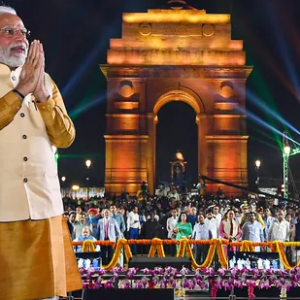Book Review:
‘Half Lion – How P.V. Narsimha Rao Transformed India’
Author: Vinay Sitapati
Publisher: Penguin Books Limited
Price: Rs.699/-
Book Review by: Jayraj Pandya
In a nation obsessed with the utopian vision presented by its founding Prime Minister and carried forward by his dynasty by being in power for all but five years till 1991, it is a highly improbable task to tinker with the status quo let alone bring about a transformation. It requires a man with the audacity of a lion, dwarfed as a mouse but equipped with the shrewdness of a fox, to achieve this improbability. The man who finally achieved this feat was none other than – Pamulaparti Venkata (PV) Narsimha Rao. At the age of 70, and with the intention to retire from active politics and become the head of a Hindu Monastery, Rao was presented with an invaluable opportunity to transform the nation. This book charts the journey of this man, from his origins in rural Andhra to the Prime Minister’s Office.
Half Lion is an attempt by its author Vinay Sitapati to put forward an honest account of PV Narasimha Rao’s life. For the most part, the author does not get lured into a trap of making it a hagiography. With an extremely dramatic chapter to begin with (the author uses his journalistic experience to excellent use) he describes the immediate events post the former Prime Minister’s death. Throughout the book, the author consistently weaves a narrative highlighting the apathy shown by the country’s grand old party for their first non-family Prime Minister to have completed a full term in office. (Late Lal Bahadur Shastry passed away within eighteen months of taking over as Prime Minister). With an access to Rao’s private papers, the author literally brings to life, several unknown facets of his subject’s life.
Rao’s tenure as the PM has been adequately documented and gets regularly featured in media stories but several critical aspects of his life have been mystifyingly neglected. The fact that PV, during his tenure as the Chief Minister of Andhra Pradesh was a devout socialist and tenuously pursued the cause of land reforms in his state, gives an illustration as to how markedly he moved away from his economic thought-process when he became the Prime Minister.
Possessing an acute sense of understanding the need of the hour was a precious gift Rao had.
When the country needed to deliver a message in 1994, despite opposition, Rao sent Atal Bihari Vajpayee as the Head of the Delegation to the United Nations Human Rights Commission meeting in Geneva which gave out subtle but clear messages that the country was united on the Kashmor question and that he put national interest above everything else.
This book brings out the ability of Rao to adapt to circumstances. Gauging the fact that the newly elected young Prime Minister Rajiv Gandhi was not too supportive of the old guard, Rao made the most of the opportunities given to him. It was during his tenure as the Minister for Human Resources Development that the New Education Policy was framed in 1986.
Moreover, Rao realigned his thought process in order to acclimatise to the post Cold War World where free markets shall acquire the center stage based on his understanding of its benefits acquired during his several trips to the United States. His ability to adapt to technology, that too learning complex languages including coding at his age, was a perfect example of his open-mindedness.The book magnifies the most pertinent quality of the former Prime Minister- his reticence. His ability to keep a low profile and conform as an underwhelming achiever gave him the enviable tag of Ajatshatru (One whose enemy is not born). Various accounts from his political life also confirm the most famous quote associated with him i.e.- “Not taking a decision is also a decision”.
However there were a few areas which deserved a more elaborate description in the book but are missing. The limited references to his family seem a deliberate attempt to keep the nature and behaviour of the family man Rao under wraps.
Moreover, the author who is extremely deft at describing the political struggles of a minority government that Rao ran for a complete tenure of five years, is short of talking about the major allegations levelled against him including the Harshad Mehta scam as well as the JMM imbroglio.
Someone with access to the personal papers of such an compulsive reader and writer, could have surely written more about the these aspects of Rao’s life. Or maybe it is the case what a renowned journalist was famously told by PV himself stands true to the T, “Let me take a few secrets to my grave.”
Notwithstanding these limited shortcomings, Half Lion is an outstanding attempt to give a balanced account of the PV Narasimha Rao, who many consider to be the best Congress PM India ever had.
In the conclusion, I would like to mention the most remarkable feature which I felt about the book. Just like the man himself, drawing inference from Hindu scriptures, the author drew a brilliant analogy of the name of the protagonist (Narsimha) with its actual meaning (sixth Avatar of Vishnu) and then with its English translation (Half Lion), literally brought to life his personality- ‘Audacity of a lion warped with the charm of a dead Fish.’
Reviewer serves as an Assistant Private Secretary to a Minister of State, Govt. of India. The views expressed here are his own.


